Democracy

NATIONAL GUARD TROOPS appearing on the streets of Washington, D.C., last summer was a bit of a surprise. At first, I thought they might have been soldiers left over from Donald Trump’s birthday parade who had wandered off into the city—attracted by the beauty and relative safety of our town—and then missed their ride home. Or maybe the president needed seat fillers for this year’s Kennedy Center Honors of B-List Has-Beens. (At press time, tickets were still available.)
But no, D.C., like L.A. in June, was just a test run for National Guard troops as political intimidation, since aimed at Memphis, Portland, Ore., and Chicago.
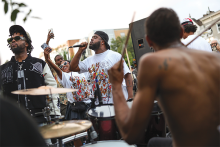
Those of us who live in the District of Columbia grow accustomed to watching major events unfold in our city. But the hyped-up “crime emergency” President Trump declared in Washington, D.C. in August was different.
An alphabet soup of federal law enforcement officers—DEA, FBI, Park Police, U.S. Customs and Border Protection, ICE—joined National Guard troops and our police force to set up checkpoints, patrol neighborhoods, and arrest people for some felonies, yes, but according to an NPR report, mainly misdemeanors, traffic offenses, or charges that were later dropped. Friends and neighbors shared chilling footage of aggressive immigration enforcement; one friend described the helpless feeling after watching ICE surround a car, break a window, and snatch a neighbor.
We are not the first U.S. city this year to face armed soldiers (we see you, L.A.) or the last. But D.C. has fewer official means to push back: The District only gained “home rule” in 1973 and Congress can—and does—override laws approved by our council or voters. The president can also intercede in our affairs.

WE KNEW THIS would be hard. But as the litany of harms rolling out of the White House grows, so has the creeping sense that our efforts to help are inadequate. Sure, we may know the drill to counter these assaults on people and our civic norms: Contact elected officials, offer support to those most impacted, donate, pray, take breaks, and jump back in. But in the face of an administration increasingly comfortable with authoritarian tactics — spreading disinformation, expanding executive power, silencing critics, scapegoating minority communities, detaining and deporting immigrants with no due process, and hamstringing independent institutions — is any of it really enough?
In early April, Sojourners editor in chief Betsy Shirley took these questions to Jarvis Williams, a pastor-turned-pro-democracy-organizer who shifted careers after recognizing that many of the prayer requests his congregants whispered to him were rooted in pain stemming from public policy decisions. His desire to respond eventually led him to join the Horizons Project, a nonprofit that aims to strengthen the ecosystem of different groups working for social change, including veterans, Indigenous organizations, faith communities, racial justice activists, union members, and business leaders. In their conversation, Williams shared his strategies to avoid feeling overwhelmed, insight about where Christians can make the most impact, and some pastoral tough love for those of us prone to forget that America’s problems didn’t start with a particular politician or election cycle. — The Editors
Betsy Shirley, Sojourners: As a pro-democracy organizer, how would you describe what’s happened in the U.S. in the past few months?
Jarvis Williams: If I’m talking with Christians, I would talk about the inability of us as a political community to demonstrate equal concern for all people. We have forgotten how powerful sharing is. We have created a political demonstration of the refusal to keep striving to share what we have.

I’ve been caring for the dying since I was 22 years old. Before the rise in death doula work, I was a caregiver for my mother, who died of primary peritoneal carcinoma at 58 –years old. I sat with her during her chemotherapy appointments. I took notes at appointments with doctors. I created a rapport with her medical team so that I could be in the best position to advocate for her up until the very end.
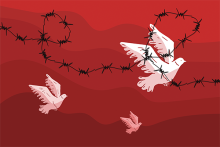
FOR THE FIRST time, Americans have elected a wannabe dictator as president. Donald Trump is committed to and now capable of ending democracy as we know it. Trump is the one the “new authoritarians” have been waiting for. What now?
First, as of January 2025, the United States is on track to become an electoral autocracy. Electoral autocracies have multiparty systems and independent institutions that over time lose sufficient power to hold the executive branch accountable for its corruption or restrict its lawlessness. The Republican trifecta in November was not the presidency, Senate, and House. It was the White House, Congress, and Supreme Court. This win enables what political scientists call “state capture” by anti-democratic forces.
Whatever else we do, we must reorient our political map.
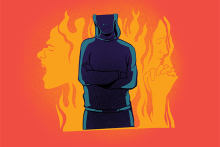
WHEN RAGE OR disappointment, petty or vast, grips me, I sometimes lower my blood pressure with Lyle Lovett’s song “God Will,” in which the narrator asks his unfaithful partner who will trust, love, and forgive them for a litany of sins. The narrator answers his own questions in the chorus:
God does, but I don’t
God will, but I won’t
I use these words in the moments when I’m unable to release anger or to feel love toward those who have caused harm — I may be steaming, but I’ll accept for now that God loves and will forgive the people who I won’t (for now). There, in that space between who I am and who I believe God to be, my fury and pain can bide their time.
I have muttered “God will, but I won’t” a lot since Election Day, about political leaders and operatives who infuriate me and those who voted them into power.
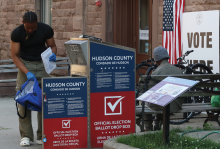
POLL WORKERS ARE everyday people, who are well trained in the process, who step up and serve their communities. Poll workers and election officials at all different polling locations have very strict guidelines on how to handle the equipment and the ballots. You can see these people, in real time, handling these things effectively and following the rules.
Both as a democracy advocate and as a Christian, I put a big value on honesty and on the truth. A democracy needs well-informed people who understand what the truth is, and we need leaders who make decisions based on the truth.

In 2012 I was a U.S. State Department officer deployed to Turkey to work with the Syrian opposition. It was an opportunity to support Syrian activists waging a remarkable popular struggle against an authoritarian government that had responded to peaceful protest with bullets and torture. For nearly a year, Syrian Sunnis, Christians, Kurds, Druze, Alawites, and others used demonstrations, sit-ins, resistance music, colorful graffiti, consumer boycotts, and dozens of other nonviolent tactics to challenge the Bashar al-Assad administration. But the nonviolent movement was unable to remain resilient in the face of brutality, external support for civil resistance was weak, and finally Syrians took up arms. This played into Assad’s hand. Death, displacement, and destruction skyrocketed. Extremists exploited the chaos. The Syrian nonviolent pro-democracy forces were inspired and courageous but lacked organization and adequate support to prepare them for the long haul. This haunts me to this day.
I’ve worked around the world with scholars, activists, policy makers, and faith communities to design effective support for nonviolent struggles to defend and advance freedom and dignity. I’ve been mentored by leaders of the U.S. civil rights movement, the greatest pro-democracy movement in our history, whose strategic campaigns to dismantle racial authoritarianism hold great relevance today.
As we head into the 2024 election, the risks to freedom and democracy are higher than they’ve been for decades. Religious communities who understand that democracy is the best modern governing system for protecting religious freedom and advancing shared values have a critical role to play as partisans for democracy.

When Girls Govern
The documentary Girls State follows a group of dedicated high school girls as they participate in an immersive mock-government program. At a time when civic norms are being eroded, the film is a fascinating, hopeful, and human portrait of American democracy’s future. Apple TV+
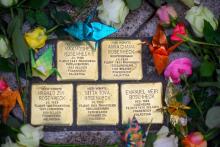
In 1935, across the river from where my family lived, the Nazi-run parliament unanimously passed the Reich Citizenship Law. A deepening of the already emerging racial regime, this law categorized who was a German citizen, initially stripping those of Jewish descent of their citizenship. Proof of Aryan descent became essential to maintain or gain citizenship, and this was done primarily through both ancestral birth certificates and ecclesial baptismal records. This use of sacramental records meant that, according to historian Kyle Jantzen, “Churches became the most important site for the implementation of Nazi racial segregation.”
With their citizenship stripped from them and sensing the deadly direction Germany was headed, my great-grandmother acquired forged baptismal certificates and the family fled. Initially escaping to Palestine, they eventually made their way to the U.S. I was raised Christian. But I still struggle with this, now being a part of the faith that inflicted displacement upon my family. I lack a coherent emotional grasp of this story, but I can feel the rough shape of the loss. That loss is unexpectedly present, something I stumble over. But in this stumbling is a small, personal grace that has transformed my faith, bringing me to worship a God who is not simply for the oppressed but engages in the work of liberation.
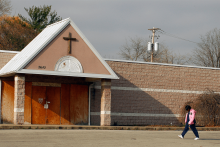
A new report from Pew Research Center found that while most Americans think religion has a positive influence on American life, few are willing to have discussions about religious differences.
The report revealed that a majority of American adults (80 percent) would say that “religion’s role in American life is shrinking,” which Pew reported as the highest in the survey’s history. Majorities in each religious group and the religiously unaffiliated say religion is losing influence.
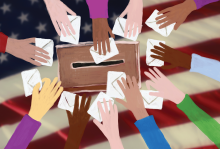
DEMOCRACIES OFTEN DIE by a thousand small cuts. The slide from a robust, if unfinished, democracy to an authoritarian government is incremental and uses inherent weaknesses in a country’s institution and culture. In the U.S., racism has been a core weakness debilitating progress toward a vibrant inclusive democracy, exploited by autocrats to maintain power no matter the cost to human dignity and freedom.
Since 2015, the U.S. democracy score has slid from 92 to 83, according to Freedom House’s global index, lower than any democracy in Western Europe. At a point when pro-democracy and anti-racism movements need to be strongest in the U.S., we find them at odds.
I work in many pro-democracy coalitions committed to political and ideological pluralism where it is challenging to identify the role of white supremacy and Christian nationalism in undermining democratic norms. Conservatives see these as “leftist” issues and moderates fear dividing an already fragile coalition. I also work with political progressives who often see police brutality and mass incarceration as aberrations in a functioning democracy rather than direct attacks on democracy itself, as political scientists Vesla M. Weaver and Gwen Prowse have laid out in their analysis of racial authoritarianism and as Black intellectuals and activists have understood for decades.
Authoritarianism is a system that concentrates wealth and power in a relatively small group of unaccountable people. Authoritarian systems are made up of authoritarian leaders and their institutional enablers, including members of political parties, media outlets, businesses, and religious institutions who provide autocrats with critical sources of social, political, economic, and financial power. Authoritarian systems engage in a range of anti-democratic behaviors to consolidate or expand power, such as weaponizing disinformation, gutting institutional checks on power, subverting free and fair elections, undermining civil liberties, and condoning political violence.
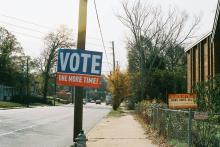
It’s an election year again, and so far it sees that President Joe Biden and former President Donald J. Trump will again be on the ballot for the White House in 2024. For many churches, that means a repeat of 2020’s division, misinformation, and difficult decisions about corporate worship.
Buckle up.
We have been on this ride before, but that doesn’t mean it will be any easier.

Editor's note: As of Jan. 10, 2024, the Committee to Protect Journalists has documented at least 79 journalists and media workers killed in Israel, Gaza, and the West Bank since Oct. 7. This article will appear in the forthcoming February/March issue of Sojourners.
IN OCTOBER, NEARLY a week after the brutal Oct. 7 attack by Hamas militants on Israeli citizens, an Israeli military tank crew at the Israel-Lebanon border fired at a group clearly identified as press. Reuters’ journalist Issam Abdallah was killed, and six others were injured. Israel denied targeting the journalists.
While the Israeli government continues to say that the incident is under review, in December, human rights groups Amnesty International and Human Rights Watch, along with wire services Reuters and Agence France-Presse, released the results of their own investigations into the Oct. 13 missile strike.
The journalists were reporting on skirmishes between Israeli forces and Hezbollah militants. They were wearing blue helmets and flak jackets, most marked “Press.” One of their vehicles had “TV” on the hood. They had been on a hilltop on the Lebanon side of the border for around an hour before the attack. An Israeli helicopter hovered above them for 40 minutes of that time. Their identity as members of the press — civilian journalists — should have been clear.

According to recent polling from the Washington Post and the University of Maryland, Republicans are now “more sympathetic to those who stormed the U.S. Capitol and more likely to absolve Donald Trump of responsibility for the attack than they were in 2021.” The same polling found that Americans were now slightly less likely to believe that President Joe Biden’s win was legitimate and more likely to believe there was “solid evidence” of voter fraud.

In a televised interview this week with Sean Hannity of Fox News, former President Donald Trump initially refused to answer the question of whether, if elected in 2024, he would be a dictator or use his power to seek retribution for his political opponents. After Hannity pressed further, Trump said he would only be a dictator on “day one” of a new presidency; he did rule out political retribution. This should be shocking, but are any of us surprised? Trump is known for his lying and exaggeration. Nevertheless, we make a grave mistake if we don’t take Trump’s words seriously.

As we officially enter the season of primaries, advertising campaigns, and debates, faith communities are as central to the election process as they ever have been. Even with the nationwide decline in religiosity and trust in institutions, religious leaders and congregations are central community builders for millions of people in the U.S.
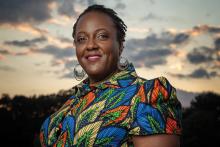
WHEN I WAS 8 years old, I fried an egg on the street. Well, I tried to fry an egg on the street. It had been a particularly brutal summer in Florida. On the days when the playground slides were too hot to go down, my mom would say, “It’s hot enough to fry an egg on the sidewalk!” I kept my eyes glued to that splattered yolk for two hours until a car tire brought the grand breakfast experiment to an end. Frying eggs on sidewalks was how I learned to conceptualize extreme heat.
When it comes to describing climate change urgency in Black communities, Heather McTeer Toney taps into something simple: streetlights. In Before the Streetlights Come On: Black America’s Urgent Call for Climate Solutions, she writes that when she was growing up, kids could play all day outdoors, but they had to be home “before the streetlights came on.” As twilight settled in and streetlights started to flicker, kids would call out, “Hurry up, we ain’t got all day!”
“Right now, that same call to action is carried in the waves of massive hurricanes, on the winds of devastating firestorms, and in the uncharacteristic heat of winter,” McTeer Toney writes. Using a familiar metaphor, she issues a call to action of her own.
Climate change and environmental justice is not foreign to McTeer Toney or the communities she writes about. At age 27, she was the first female and youngest person to serve as mayor of Greenville, Miss., where she was born and raised. As mayor, she brought the city out of debt and established sustainable infrastructure repair. For three years, she led the Environmental Protection Agency for the southeastern United States. While at the global nonprofit Environmental Defense Fund, she addressed environmental policy and community organizing within and beyond the U.S. This spring, McTeer Toney became executive director of Beyond Petrochemicals, a campaign to stop the rapid expansion of petrochemical and plastic pollution, particularly in the Ohio River valley and along the Gulf Coast.
McTeer Toney and her family attend Oxford University United Methodist Church in Oxford, Miss. I spoke with her by phone about her work, her book, and the hope her faith demands. — Christina Colón

The situation is dire but U.S. climate policy is not changing. While lawmakers in the U.S. are stuck at tax credits for electric vehicles, a sixth mass extinction event is already here. Electric vehicles and small-scale conservation efforts can’t fix this.
There are two problems at hand: First, there is a material problem. Humans, especially humans in the richest nations, are producing and consuming too much, which not only contributes to pollution, but also increases emissions and causes a never-ending sprawl of unsustainable land use. This ultimately displaces animals from their habitats. The second problem is a spiritual problem: Humans have become so alienated from other nonhuman species that they no longer recognize themselves as a part of creation. Instead, humans view themselves as above it.
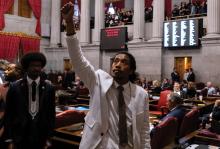
Justin Jones is a Tennessee state legislator representing Nashville. He spoke with Sojourners’ Mitchell Atencio.
What they were trying to do wasn’t just expel us, but the movements we are standing in solidarity with. It’s not ironic that it happened on the day before Good Friday. They tried to crucify democracy and I [was reinstated] the Monday after Easter as a testament to the resurrection of a movement for multiracial democracy here in the South. The resurrection of a Third Reconstruction [is] being led by students and young people — that’s a very powerful vision. If it’s possible here in the South, if it’s possible in Tennessee, that should give us some hope in the nation.